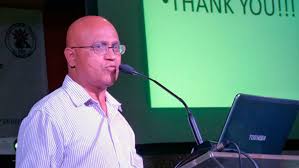On Free & Fair Elections and Int’l Observers
Dear Editor,
I applaud your editorial (KN March 1) wherein your paper has taken the principled position to be neutral in the elections and not to endorse any party. I also salute your paper for carrying commentaries related to all parties and the election commission as well as for publishing opinion polls. We must have free and fair and credible elections. Like your paper, the diplomatic community and international observers must also be neutral and take steps to guarantee us free and fair elections. Will the elections be free and fair?
Observers are invited to monitor the elections in order to certify its credibility – whether preparations (list, etc.) allow for a genuinely free and fair election (FFE) and whether the outcome is a true reflection of the will of voters. Since the 1990s, observers came to Guyana that had or have a history of fraudulent elections. Refusing observers is tantamount to accepting that government or the elections commission had/has plans to rig the elections. Thus, the President and Gecom have invited observers to monitor the electoral process. But their presence does not mean the election will be free and fair.
Elections since 1992 were marred by malfeasance and some outright fraud. Election officials were known to and still take sides. That is why Guyana needs observers to ensure FFE.
Observers are invited to monitor Guyana’s elections from a number of organization not the least being the Carter Center, International Republican Institute, Caricom, UNASUR, Commonwealth, European Union, OAS, UN, among others. Observers do not prevent fraud. Rather they document and report irregularities. Is it possible for observers to certify an election whose results is fraudulent? Kenya’s elections of 2017 was certified by observers including by former Secretary of State John Kerry only to have it thrown out by the court because of fraud embarrassing the international observers. So foreigners monitoring an election is not a cure for fraud. Nevertheless, their presence is critical to combat fraud and every effort must be made to deter fraud which has become institutionalized in Guyana.
International observers are limited in their presence for the Guyana elections. There are 1,000 observers and 2,300 polling stations. They can’t be everywhere to deter fraud. In addition, they have not been present during the registration process and have not monitored the list of voters to check on the existence of voters. Neither house to house check nor scientific testing of the registrants was carried out for accuracy of the list. Some 200K (out of 662K) voters are on the list even though they migrated or died. Others could potentially impersonate and vote for them as indeed happened in previous elections. The observers and polling agents will have to look for individuals attempting to impersonate other voters – look at faces carefully, especially in the afternoon hours, and be certain that the person presenting himself or herself matches the photo on the roster. The agents have to examine fingers carefully for traces of ink although it is possible that watered down ink could be use and as such easily washable.
One of the problems with monitoring voting process is the observers can’t be present at every polling station (given limited number) and at the computing office to prevent skullduggery or outright fraud. The various teams of observers don’t cooperate with one another. An observer is not positioned at a polling station during the entire voting process (6 AM to 6 PM). Observers visit a polling station to check if all is well – has enough ballots and whether people are able to cast ballots, etc. Then they move on. At the time of a visit at a polling place, all would be well because staff and the party agents would not want to violate the sanctity of the voting process in the presence of observers. As soon as the observers leave, and unlikely to return, skullduggery is employed – boxes are stuffed, agents thrown out of stations, multiple voting, etc.
Guyana had a history of provocateurs starting fires (arson) or fights or some kind of violence in the vicinity of a polling place to create distraction or to intimidate voters discouraging them to cast ballots. This tactic was employed at every election. During the mayhem, polling places are rushed. Ballot boxes are raided and stuffed. Another tactic is to threaten or intimidate polling agents to force them out of stations. In every election, polling agents were ejected and boxes stuffed. There was also multiple voting. Thus, one never got a true reflection of the voter support for the two main parties in Guyana.
Counting of ballots and statements of polls were also problematic. Fake statements were introduced in the last election. And there were problems with spoilt or rejected ballots and even failed recounts. There can be improper tallies; numbers may be placed under an incorrect party column. Recount should be undertaken to verify results, each region, and nationally although Returning Officers and high officials were known to disappear to avoid requests for recounts.
Observers are most important to this election. In order to enhance the integrity of the electoral process, they are urged to take note of the above concerns to deter fraud and like the media help to guarantee a free and fair election.
Regrettably, only one side will win. I wish if an outcome was possible in which both sides win – share power for all the people to be a part of the government.
Yours truly,
Dr Vishnu Bisram






















